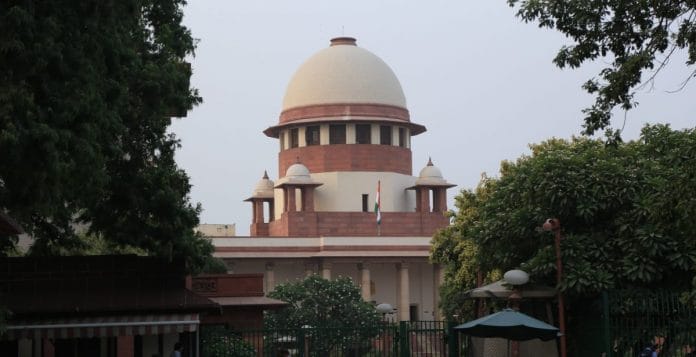SC rules that if both parties from first marriage have amicably parted but case pending in court, then second marriage still valid.
New Delhi: The Supreme Court has clarified that a second marriage is valid even if divorce proceedings of the first marriage are pending in court, provided that both parties from the first marriage have amicably parted and have decided not to contest the decision.
Interpreting the Hindu Marriage Act, justices S.A. Bobde and L. Nageswara Rao, however, said, “The dissolution of the marriage is complete once the court finalises the order, subject of course to appeal. In case of dissolution of marriage, a second marriage shall be lawful only after the dismissal of the appeal”.
The apex court’s judgment came on a plea wherein the second wife contested the marriage with her husband on the grounds that it took place before the appeal of his divorce was finalised.
The husband had appealed against his first divorce in the Delhi High Court. He, however, settled the dispute with his first wife and filed an application to withdraw his appeal on 28 November 2011. Before the court could formally rule on the plea, the man married for the second time on 6 December 2011.
Also read: Anand Marriage Act: An assertion of Sikh identity in the face of UCC demands
With his other marriage too running into trouble, his second wife took him to court claiming that their marriage was null and void as it had taken place during the pendency of proceedings of his first divorce.
Ruling on the plea, the two-judge bench Friday said the man’s intent was clear from his application. “…After entering into a settlement (with the first wife), he (the husband) did not intend to contest the decree of divorce. His intention was made clear by the filing of the application for withdrawal. It cannot be said that he has to wait till a formal order is passed in the appeal, or otherwise his marriage dated 06.12.2011 shall be unlawful,” the court said.
Therefore, the court ruled, the appeal is deemed to have been withdrawn on 28 November, 2011 — the date he filed the application. It added that on 6 December 2011, the date of his second marriage, the first wife cannot be considered as a living spouse. Hence, Section 5 (i) is not attracted and the marriage between the second wife and the husband cannot be declared as void, the apex court said.
“The dissolution of the marriage is complete once the decree is made, subject of course to appeal. This court also decided that incapacity for the second marriage for a certain period of time does not have the effect of treating the former marriage as subsisting and the express ‘spouse’ would not include within its meaning the expression former spouse,” it said while relying on its 1978 judgment.
‘Hindu Marriage Act a social welfare legislation’
The apex court further said that the Hindu Marriage Act is a social welfare legislation and as such, it cannot interpret such as laws as though they were cast in stone. “The Hindu Marriage Act is a social welfare legislation and a beneficent legislation and it has to be interpreted in a manner which advances the object of the legislation. The Act intends to bring about social reforms. It is well known that this court cannot interpret a socially beneficial legislation on the basis as if the words therein are cast in stone,” Rao, who authored the judgement, said.
“It would thus appear that the law is already settled by this Court that a marriage contracted during a prescribed period will not be void because it was contracted under an incapacity. Obviously, this would have no bearing on the other conditions of a valid marriage,” the bench said.
“In any event, in the present case we are satisfied that the appellant’s marriage was not subsisting when he married again. He had filed an application for withdrawal of his appeal against the decree for dissolution and had done nothing to contradict his intention to accept the decree of dissolution,” Bobde said in a separate but concurring judgment.
Also read: Modi govt’s triple talaq bill places burden on Muslim women to prove the offence







My boyfriend married in temple not legally in court. Still can he file divorce in court legally To get seperated because we both want to do court marriage first for me and second marriage for him.
What was the name of the cases taken and referred here??
Could you please tell?
My divorce is under process. If I do second marriage, can I register my second marriage legally?
Secondary married in government employee
Earlier it was not so but after this judgement it can be done but specific advice can be given only after going through the entire judgement… however you should bear one thing in mind that it applies only when the couple is seeking divorce by way of compromise and have filed the application in this regard before the Hon’ble Court it must not be confused with cases where Divorce is being contested on Merits……as on Merits there are chances that divorce may not be granted by the Hon’ble Court
My divorce is under process. If I do second marriage, can I register my second marriage legally?